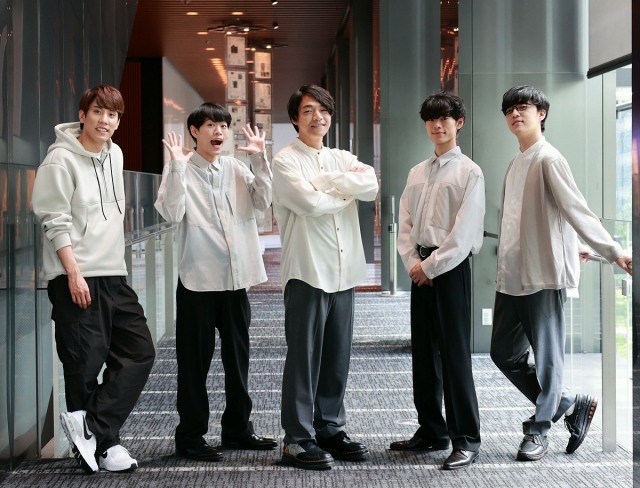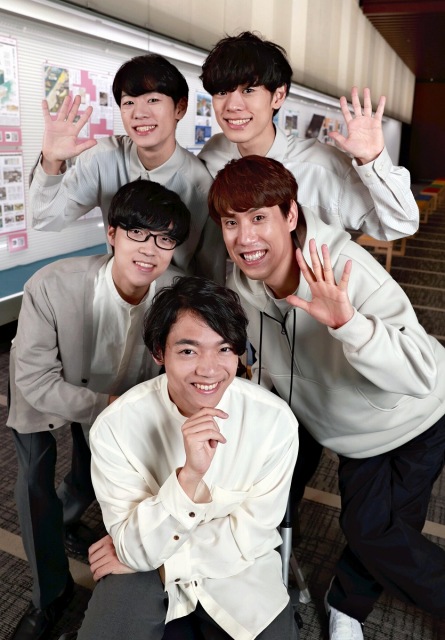QuizKnock Entertains and Informs with ‘Correct’ Quizzes; Meet the Group Bound by ‘Respect for Knowledge’

Members of QuizKnock, an intellectual media group that started at the University of Tokyo, pose for a photo. From left: Shunki Sugai, Mon Higashi, Takushi Izawa, Gon Higashi and Fukura P
12:00 JST, July 26, 2024
QuizKnock, an intellectual media group that started at the University of Tokyo, brings out the fun side of learning with its question-and-answer-style entertainment, and for that it enjoys immense popularity.
QuizKnock was started in October 2016 by then University of Tokyo student Takushi Izawa, a competitive quiz champion who, as a student at Kaisei High School in Tokyo, became the first person to win two consecutive solo division championships in the All Japan High School Quiz Championship.
The group provides educational content, combining entertainment and learning in the form of quizzes and riddles in YouTube videos and web articles.
About 200 people are involved in QuizKnock, including the writers of the web articles, employees of its management company and part-time workers.
The Yomiuri Shimbun interviewed Izawa, Fukura P and Shunki Sugai, who have inside knowledge of the early days of the group, and the Higashi twin brothers, Mon and Gon, university students who joined the group in 2022. The twins are also members of the University of Tokyo Quiz Club.
They talked about a lot of things, from the history of this group that revolutionized the quiz world to the secrets of making quizzes.
Recalling his ambition at the time of founding the group, Izawa said: “The University of Tokyo Quiz Club had wonderful members, but they made one-off quizzes for cheap wages. I felt like the situation was no good.”
He added, “I wanted to create a system that would encourage people to proactively seek out information, in cooperation with young quiz-savvy members who have high information literacy.”
Initially, the group mainly wrote their quizzes out in web articles, but that approach did little to raise the group’s public profile. “It didn’t work well,” Izawa said.
A dramatic change occurred in December of 2016, when Fukura P, who was already working as a quiz maker, joined the group.
Recalling that time, Fukura P said: “I was watching a lot of YouTube.” Becoming more and more aware of the potential of the medium, he worked hard to open and promote a YouTube channel to bring QuizKnock to the world.

Members of QuizKnock
The team started out by watching and learning from other videos.
“At first, I was the only one who talked in the videos,” Izawa said with an embarrassed smile.
The channel was upgraded thanks to “the tremendous amount of research that Fukura did,” Izawa said. A bunch of projects helped the channel gradually gain more views, and now it has become a major pillar of QuizKnock.
In 2017, the group got a new member: Sugai, known for his catchy self-introduction, “I’m Sugai, a nice guy!”
Sugai, who has a PhD in the field of superconductivity, was originally not a quiz contestant. He acts like Watson, Sherlock Holmes’ assistant, and explains difficult questions in an easy-to-understand manner, assisted by his cheerful character. He helped greatly to spread QuizKnock’s concept — “Learning is fun” — to vast numbers of people.
By getting people with various talents involved, the group has created huge waves in the quiz world. It continues to attract new talent, such as the Higashi brothers from the University of Tokyo Quiz Club, opening up new possibilities for quizzes.
Must be correct and fun
The Yomiuri Shimbun asked the five people who continue to create the group’s various quizzes what is important when making a quiz.
Gon Higashi said: “The most important thing is ‘to be correct.’ It may seem obvious, but it’s very important.”
He also said: “If there are multiple possible answers to a question, it shouldn’t be included in the quiz without a lot of research first, just because the topic or the possible answers are interesting.”
Sugai talked about the use of subtitles for explanations in the videos, saying: “I try really hard to cut down on text length and still properly explain things. That’s where I really put in the work.”
Summing up the group’s approach, Izawa said, “A quiz is a type of entertainment based on correctness.”
He added: “Quizzes are interesting even though the content is invariably factual. That’s the unique element of an entertaining quiz.”
His skillful use of language helps him explain the appeal of quizzes quite well.
Ideal ‘workplace’
It was clear from the conversation that the five get along very well. The Yomiuri Shimbun asked the team what QuizKnock means to them.
“It’s a workplace. Interesting people come together and get down to business when it comes to work. What a wonderful workplace,” Izawa said.
Sugai said: “It’s a workplace for me, too, but people are surprised to hear that. I think too many people hate working [laughs].”
Mon Higashi said: “It’s the ideal ‘basaki’ [part-time job]! I get paid to do quizzes. And everyone here has respect for knowledge, so we can talk about the same topics even though we are all different ages!”
Izawa said: “Right. We all share that value.”
QuizKnock is united by “respect for knowledge.” We expect the group will keep providing us with new intellectual excitement!
Top Articles in Society
-

Producer Behind Pop Group XG Arrested for Cocaine Possession
-

Man Infected with Measles Reportedly Dined at Restaurant in Tokyo Station
-

Man Infected with Measles May Have Come in Contact with Many People in Tokyo, Went to Store, Restaurant Around When Symptoms Emerged
-

Woman with Measles Visited Hospital in Tokyo Multiple Times Before Being Diagnosed with Disease
-

Australian Woman Dies After Mishap on Ski Lift in Nagano Prefecture
JN ACCESS RANKING
-

Producer Behind Pop Group XG Arrested for Cocaine Possession
-

Japan PM Takaichi’s Cabinet Resigns en Masse
-

Man Infected with Measles Reportedly Dined at Restaurant in Tokyo Station
-

Israeli Ambassador to Japan Speaks about Japan’s Role in the Reconstruction of Gaza
-

Videos Plagiarized, Reposted with False Subtitles Claiming ‘Ryukyu Belongs to China’; Anti-China False Information Also Posted in Japan

























